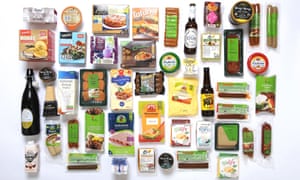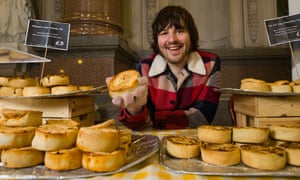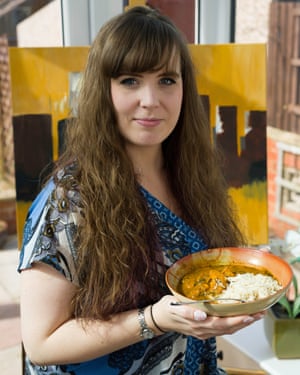
The unstoppable rise of veganism: how a fringe movement went mainstream
Health, climate change, animal welfare… whats driving more people and brands to embrace a plant-based lifestyle? We investigate, and, below, four vegans explain their choice

Late on a Thursday afternoon in early March, just off Brick Lane in the heart of Londons nightlife hotspot Shoreditch, 23-year-old Louisa Davidson is taking calls and co-ordinating cables and scaffolds, as shocking pink Vegan Nights banners are hung around the expansive courtyards of the Truman Brewery. There is a chill in the air, quickly warmed by a buzzing atmosphere more like a music festival than an ethical food fair, as BBC Radio 1Xtra and House of Camden DJs play records, cocktails are poured and entrepreneurs sell zines and street wear alongside the vegan sushi, patisserie and filthy vegan junk food.
Davidson had been running weekend markets at the venue when she noticed a sharp increase in the number of vegan food businesses and vegan menus on offer. So last September, with her colleagues, she decided to put on a one-off vegan night market, with music, drinks and food. On the day there were queues around the corner, she says. We were not prepared for it at all! There was so much interest that by Christmas we decided to make it a monthly thing. Its all happened very quickly. Inspired by its success, and the traders she was working with, Davidson switched from vegetarian to a vegan diet in January.
Were riding on that wave of veganism getting into the mainstream, Davidson says. People are curious about it and theyre finding out that vegan food is not just a boring salad, its experimental, and the food traders are amazing people can have a drink, listen to music and hang out. First and foremost, we want to offer a positive platform, whether youve never had a fried jackfruit before or youre a longstanding vegan. Many of the traders are new to it as well, with a couple of them having launched their businesses at Vegan Nights. It is a community and everyone supports each others businesses. Its great to be a part of it.
Quick guideVeganism in numbers
Rise in the number of vegans in Britain from 2006-2016; 542,000 people said they were vegans in 2016.
Veganuary 2018 participants, of which 60% were under 35, up from 3,300 on its 2014 launch.
Increase in vegan products launched in the UK between 2012 and 2016.
The year the term vegan was coined by woodwork teacher Donald Watson. Rejected words include dairyban, vitan and benevore.
Percentage of under-35s who have tried a vegan diet.
Veganism might have recently acquired a hipster cache at buzzy London events such as Vegan Nights and the weekly Hackney Downs market established by influential blogger Sean OCallaghan, AKA the Fat Gay Vegan, but its surging popularity is a national phenomenon, with plant-based food festivals and businesses booming from Bristol to Inverness.
The high street is adapting with incredible speed. Big chains such as Marks & Spencer and Pret a Manger have introduced vegan ranges, Wagamama has a new vegan menu, Pizza Hut recently joined Pizza Express and Zizzi in offering vegan pizzas, while last year Guinness went vegan and stopped using fish bladders in its brewing process, after two and a half centuries. Scrolling through Twitters popular #veganhour (an hour of online recipes and ideas running 7-8pm every Tuesday, and trending at number seven nationally when I looked), alongside less surprising corporate interventions from Holland & Barrett and Heavenly Organics is a tweet from Toby Carvery, trumpeting its vegan cherry and chocolate torte. Sainsburys and Tesco have introduced extended new ranges of vegan products, while the latter recently appointed American chef Derek Sarno to the impressive job title of director of plant-based innovation.
If this is the year of mainstream veganism, as every trend forecaster and market analyst seems to agree, then there is not one single cause, but a perfect plant-based storm of factors. People cite one or more of three key motives for going vegan animal welfare, environmental concerns and personal health and it is being accompanied by an endless array of new business startups, cookbooks, YouTube channels, trendy events and polemical documentaries. The traditional food industry is desperately trying to catch up with the flourishing grassroots demand. What do you mean, weak, limp and weedy? In 2017, the vegan category is robust, energetic, and flush with crowdfunding cash, ran an article headlined Vegan Nation in industry bible the Grocer in November, pointing to new plant-based burger company Vurger, which hit its 150,000 investment target in little more than 24 hours.
The rapid explosion of the annual Veganuary campaign, in which curious omnivores and vegetarians sign up to try out veganism for a month and are then plied with recipes and other advice, shows how fast veganism is growing. (The choice of January is significant, given the resonances of fresh starts, good intentions and post-Christmas diets.) Veganuary was launched in 2014, with 3,300 people signing up; by 2016, there were 23,000 participants, then 59,500 in 2017, and a staggering 168,000 this year and these are just the numbers that signed up officially online. Notably, 84% of this years registered participants were female, while 60% were aged under 35. Showbiz magazines and websites are full of lists of fully vegan celebrities Ellie Goulding, Natalie Portman, Ariana Grande, Woody Harrelson, JME, Ellen DeGeneres, Liam Hemsworth; we could go on all of them making Beyonc and Jay-Z look a bit wet, having tried a vegan diet for just 22 days.
A weekend outing to Blackpool in 2018 offers much of what it always did: seagulls, slot machines, big-screen sport, family meal deals, traditional fish and chips, pirate rides, poncho vendors, palm-readers and pound shops. But there are other, newer diversions, too. On a grey Saturday morning in low season, at St Thomas church, north of the city centre, the Blackpool Vegan and Green festival is humming with people. Something of the churchs evangelical spirit is alive here, too.
Were in a non-vegan world, says volunteer Elizabeth King, delivering her 10 steps to going vegan talk in a back-room. But things are changing rapidly and if youre trying to go vegan, youre a pioneer. She talks about shopping challenges and getting around social stigma, meal-planning and vitamin supplements, how to make holidays and dining out easier, how to check labels and online resources and the group of new vegans and could-be-vegans asks keen questions and shares local tips. People have an assumption you live off lettuce, dont they? But thats changing.
With almond milk and vegan ranges now available in supermarkets, its a testament to soaring public curiosity that people are being drawn to once specialist events in such numbers. Its jam-packed isnt it! says Michelle Makita, with a laugh, from the Little Blue Hen vegan soap stall. Over the course of the day, hundreds of people stream in; visitors from across Blackpool, the north-west, even Spain. There is an African superfoods stand, a Glaswegian jerk pie company, Turkish gzleme flatbreads, cakes, curries, wraps, sushi, vegan candles, vegan pet food, shlocky T-shirts and accessories (Zombies eat flesh, go vegan). Darting around in a high-vis jacket, organiser Roddy Hanson squeezes past the prams, teenagers, bearded veterans in earth-tone baja tops, normies and newbies.
Grabbing some air and calm when the lunch rush has finally subsided (at about 4pm), Hanson is a mine of information about vegan history and culture and has seen a tightly bound, activism-driven outsider community become an accepted phenomenon in a matter of a few years. When I went vegan in the 1980s, it was primarily two groups: hippies and punks. Some people who come to our events think its going to be wall-to-wall people with pink hair and piercings, but the whole culture has changed its a very broad crosssection.
He has been vegan for 30 years, a veteran of animal rights activism, but this convivial, family-day-out approach to winning converts is more his speed. Ive never been the sort of person who wants to stand outside fur shops and get into arguments with people. Its more positive this way and you can choose to engage with it if you want, rather than be confrontational. Ive been involved in anti-circus demos where fights have broken out with some of the protesters and the circus staff; that kind of thing was a lot bigger in the 80s. Now its based around vegan groups and fairs, which didnt really exist then.
Last summer, Paul White opened Faringos, the first vegan restaurant in Blackpool. Only a year ago, he was an omnivore, running a hotel with an Italian steakhouse attached in which he was also head chef. One weekend, they had a vegan guest staying, which prompted lots of lengthy conversations about veganism and he decided to try running a small vegan menu alongside the existing one. Within two weeks, we had more people eating vegan food than anything else, he recalls. What surprised us was people were coming from all over Blackpool. There were hidden vegans in Blackpool who were struggling in silence! That was June last year and at that point we decided to turn the restaurant 100% vegan and it just exploded on Facebook. I went vegan as well, as head chef, and I feel better for it. We have such a wide range of people coming in: well have a table of six people who are protesters from an anti-fracking demonstration [Preston New Road fracking site is just three miles away], sat next to a table of two people who are multimillionaires, sat next to international rugby players.
Theres been a knock-on effect to their success, he says, with numerous other restaurants in the city beginning to offer vegan options on their menus and White is preparing to open the first vegan food shop in Blackpool, too. One of the main drivers, he says, is the critical mass of information available online, both motivating people to change in the first place and making it easier than ever to do so. When people see documentaries like Cowspiracy, one is enough. The fact social media is as big as it is now, it spreads things so much faster. I think thats why its mushrooming right now. And it is mushrooming.
In May 2016, the Vegan Society commissioned Ipsos Mori to poll 10,000 people on their dietary habits and found that Britains vegan population had increased from 150,000 to 542,000 in the space of a decade (alongside a vegetarian population of 1.14 million). Of those, 63% were female and, significantly for veganisms future growth, almost half were in the 15-34 age category. What is astonishing is that the pace of change in the two years since the survey was carried out has been seemingly exponential it seems plausible to speculate the number may have doubled again in that time.
Tim Barford, manager of Europes largest vegan events company, VegfestUK, has been vegan for three decades and points to the deeper roots of this recent explosion of interest. There is a big plant-based shift culturally, he says, a systemic change in the way that were approaching food and the way that we feed ourselves. Remember that successive governments over 15 years have been ploughing money into persuading people to eat more fruit and vegetables, with the five-a-day campaign. Then youve got a real cultural change among millennials, which is very much built around justice and the way we look at animals.
He also points to a new non-violent breed of millennial activist, such as James Aspey, who took a years vow of silence to raise awareness of animal rights issues. Thirty years ago, it was more balaclavas and intimidation, almost verging on terrorist activities. This new breed are not playing up to that stereotype they recognise the danger of it. Theres a real understanding and compassion among todays activists. Im a bit older and that wasnt there in the radical 70s and 80s, with the punk rock, fuck you kind of attitude its now more reflective and therefore more effective.
That less aggressive approach is winning a lot of new converts, but for veterans such as Barford its still an evangelical movement with an irreducible political message. Our challenge with VegFest is to combine the feelgood factor, the fun and sociable atmosphere, with quite a strong moral and ethical standpoint. We want to attract people in without putting them off, but then once weve got them in, we dont want them to walk away thinking this is just a health fad, just food and shopping and entertainment.

He thinks the rise of Jeremy Corbyn a vegetarian of almost 50 years, who has recently spoken about his admiration for his vegan friends has helped fuel a definite appetite for justice. Justice is no longer a dirty word, people can have a conversation about justice for the 70bn animals killed for food, without being shot down and screamed at as a radical extremist and I think Corbyn has helped a bit, with the way hes won over a bit of the middle ground.
One influential factor that comes up regularly when talking to new vegan converts is a series of polemical online documentaries, or advocacy films, many of them on streaming services such as Netflix, documenting the damage animal agriculture does to the environment, or meat-eating does to human health, or exposing gory scenes in slaughterhouses and factory farms. In Blackpool, Michelle Makita tells me the 2005 film Earthlings, with its harrowing, hidden-camera footage of animal suffering, was the epiphany that led her to switch to veganism. I think I cried for about three days I was hysterical, she says. The thriving sub-genres titles tell their story in microcosm: Vegucated, Planeat, Forks Over Knives, Live and Let Live, Peaceable Kingdom. A common trope among recent converts is that the revelations about the brutality of the meat, dairy and egg industries were hidden from view, until these documentaries exposed them.
The genres influential break-out hit was the 2014 documentary Cowspiracy, which looks at the environmental impact of animal agriculture, its contribution to greenhouse gas emissions, deforestation and excessive water use. It is a film about climate crisis in the first place, which argues that meat and dairy farming is the hidden evil responsible for a dying planet. Made by Californian documentary-makers Keegan Kuhn and Kip Andersen, amiable frontman Andersen tells the story of how Al Gores film An Inconvenient Truth changed his life as a young man (It scared the emojis out of me) and committed him to an environmentally conscious lifestyle. With Kuhn, he has now no doubt changed the lives of countless others by persuading them that turning off the taps, cycling everywhere and home composting is not enough: that worldwide conversion to veganism is the only possible way to save the planet.
Cowspiracys marketing strapline claims it is the film environmental organisations dont want you to see. The alleged conspiracy of the title is that environmental groups such as Greenpeace, Sierra Club and the Rainforest Action Network are focusing all their efforts on fossil fuels and renewable energy, while ignoring the real threat from livestock farming. The evasiveness of their spokespeople on camera is often embarrassing, although perhaps the reason these NGOs wouldnt want people building their politics around the film is its fast-and-loose use of highly questionable statistics. The original version of the film claimed 51% of global greenhouse gases were produced by animal agriculture, based on a single, non-peer-reviewed academic paper the scientific consensus is closer to 15%. Dont use the 51% figure. Please. Youre making us all look bad, vegan author Danny Chivers wrote in the New Internationalist. If you want more people to understand that animal agriculture is a significant part of the climate change picture, bear in mind that there are lots of good reasons why many people are focusing on the fossil fuel industry and its not an either/or issue.
For the version that premiered on Netflix in 2015, Andersen and Kuhn changed the figure and Leonardo DiCaprio came onboard as executive producer. Since then, they have made an equally hard-hitting follow-up, What the Health, which looked at the effect of meat and dairy on human diseases. While their films have been controversial (registered dietician and vegan Virginia Messina called What the Health junk science), their impact as polemicists is undeniable in a world where different strategies of evangelism are always being debated. Cowspiracys original crowdfunding pitch speaks volumes about its appeal: Together, we arent just creating a movie, we are creating a movement.
Of course, the vegan movement already existed, but Cowspiracys success reflects a new emphasis on animal agriculture, in particular cattle farming, in the context of the deepening climate crisis. Critical in this refocusing from animal welfare as the primary motive for veganism was a 2006 report produced by the UN, Livestocks Long Shadow, which described the livestock sector as one of the most significant contributors to environmental degradation, both globally and locally. A follow-up UN report in 2010 warned that rising meat and dairy consumption, and a global population predicted to be 9.1 billion by 2050, meant a shift towards veganism was vital to save the world from climate catastrophe and food shortages. Overall, agriculture accounts for 70% of global freshwater consumption, 38% of total land use and 19% of the worlds greenhouse gas emissions; within this, the footprint of meat and dairy production is heavily disproportionate.
Oxford academic Dr Marco Springmann has attempted to model what a vegan planet would look like, especially as climate change, food shortages and population growth intensify. He projected that were the world to adopt a vegan diet by 2050, the global economy would benefit to the tune of $1.1tn savings in healthcare costs and environmental savings of $0.5tn and a cut in greenhouse gas emissions by two-thirds. Its quite hard to argue with numbers that speculative especially when one is not a fellow of the Oxford Martin Programme on the Future Of Food but what is certain is that the makers of Cowspiracy were right in their general argument, if not some of the key specifics.
Our motivation was that animal agriculture was so under-discussed, says Kuhn. We really felt promoting a plant-based lifestyle had to be at the forefront of the environmental movement and environmental veganism had to be a movement in itself, versus animal rights or health.
The speed of change they have witnessed since then has been exhilarating even in just four years. Information can pass so freely and easily now, Anderson says. It was only a matter of time before the truth about animal agriculture was revealed. Its not in your face like racism or sexism its deeply ingrained in our culture, and financially ingrained, but now that its revealed, people just dont want to be a part of that horrific industry. Its like a weight off their shoulders; getting clean of the lies and the destruction.
People feel empowered, it doesnt feel like a sacrifice. Thats a huge shift. Whereas before, veganism may have been viewed like you were giving up something, now its been reframed as what you gain: you gain health, you gain a greater sense of living in bounds with your values, you gain all the environmental benefits.
Kuhn says that consumer pressure from below will create a domino effect. These corporations are just going to follow the dollar, and follow consumer demand, which hopefully will force them to switch to sustainable, plant-based agriculture. The next step, he says, is to push governments to abandon tax breaks and subsidies to animal farmers. They are keeping the advocacy-via-documentary ball rolling. Currently in production are Seaspiracy, which focuses on the oceans and the myth of sustainable fishing, and Running for Good, a sports documentary following British marathon runner Fiona Oakes, to break the stereotypes that veganism holds you back from any kind of athletics.
Rapidly growing consumer awareness and changing eating habits have combined with a dawning realisation about the extent of the sustainability crisis to send shockwaves through the food production industries. With broad agreement that the future of animal agriculture has to change, the big money investors are moving quickly. Richard Branson announced last year that he was investing in a startup called Memphis Meats, which is developing lab-grown meat from animal cells as an alternative to animal agriculture, sometimes called clean meat. In 30 years or so, I believe we will be shocked [that] we killed animals en masse for food, he wrote. Tyson Foods, one of the biggest meat businesses in the world, has recently invested, joining the likes of Bill Gates and Cargill, the second-largest beef producer in the world. Its no surprise that the meat and dairy substitutes industry is predicted to be worth $40bn by 2020.
The executive vice president at Tyson, Justin Whitmore, made a telling comment in explaining the companys diversification in the face of a looming crisis of sustainability. We dont want to be disrupted, he said in February. We want to be part of the disruption. While clean meat is not vegan, by definition, it is a parallel response to the same problem and is accompanied by the soaring popularity of alternative vegan proteins such as tempeh, amaranth, seitan and nutritional yeast.
Even within the hard-headed world of big capital, there are serious manoeuvres afoot to push food production away from meat and dairy. In 2016, a group called Fairr (Farm Animal Investment Risk & Return) co-ordinated a group of 40 large institutional investment funds, including Swedish state pension funds, worth $1.25tn (almost 900bn) publicly to urge major food producers and retailers such as Kraft Heinz, Nestl, Unilever, Tesco and Walmart to develop alternative, plant-based sources.
Theres growing investor support, says Rosie Wardle, who worked on the project for Fairr. Across the board now, market research firms, food analysts, industry commentators, theyre all talking about alternative proteins and flexitarian diets theyre the key food trends for this year. The risks around intensive livestock production are becoming harder to ignore and people recognise that is going to impact business as usual.

Fairrs latest report, Plant-Based Profits, points to the rise of flexitarian diets among young adults who may not be full-time vegans. Fairrs head of research, Aarti Ramachandran, sees the industry moving only in one direction. Companies are investing in a lot of research and development because they know that todays millennials are tomorrows consumers and theyre going to be setting the stage in terms of future growth prospects. Thats a key point that our investors are interested in: this is a market thats not going to go away. Plant-based diets arent a trend or a fad; we see this very much being the basis of consumer growth.
The business world seems to agree. In the last few months, you can scarcely move on Forbes.com for articles with headlines such as Heres Why You Should Turn Your Business Vegan In 2018. With this kind of money swirling around, and a combination of hipster entrepreneurs, hedge funds and major supermarket chains defining veganism in 2018, its easy to see why some vegans feel that the movements traditional association with anti-capitalism is a position rapidly disappearing in a fog of marketing hype. Popular, youth-orientated vegan cookery startups such as Bosh.TV, which scored 1m followers on Facebook within a year of launching, as well as a Bosh! book deal, define the new spirit of veganism as a lifestyle, rather than the cornerstone of a political worldview. Just three years ago, we werent even vegan ourselves, wrote cheerful founders Henry Firth and Ian Theasby, recalling late-night kebabs on the way home from the pub. Back then, the V word had a touch of anger associated with it; it was loaded with political and ethical connotations.
The promotion of a flexitarian approach of reducing the use of animal products, without cutting them out altogether, has raised hackles among some activists. In 2014, the Vegan Society rebranded with a love vegan campaign to mark its 70th anniversary, which proposed a few small changes if full veganism seemed a step too far. This prompted a backlash among some animal rights activists and claims that the organisation was more interested in being a marketing body for vegan businesses than an ethically driven campaign group. Is veganism no more than a capitalist lifestyle choice? ran a rhetorical question on the Red Black Green blog. Veganism was for a long time associated with the counter-culture and seen as difficult, wrote Vegan Society CEO, Jasmijn de Boo, in 2013. She spoke of softening the movements image: One can become vegan in stages there are no rules and you are only answerable to your own conscience.
Veganisms mainstream rise has certainly benefited from this conscious rebranding: for better or worse, it is much cooler than it used to be. Its a lifestyle, a community, a culture, an ever-expanding club where the only price of entry is being mindful and making a positive change, goes the motto of the Young Vegans pie and mash shop in north London. Social media has spread the word with incredible speed, via Twitter hashtags, thriving wellness and cookery YouTube vloggers and Instagram influencers. Its not just the obvious clean-eating celebrities and channels that have taken up the subject: even Unilad, a site not exactly known as a bastion of compassion and political sensitivity, commissioned a powerful 20-minute documentary, Meat the End, about the horror and abuse of animal agriculture.
With a seemingly growing number of young people trying out vegan diets for personal health reasons (39% of the generally young, generally female Veganuary participants cited this as their motive), and its association with often controversial social media influencers, concerns have been raised that veganism provides a socially acceptable cover for disordered eating. Are you depriving yourself or finding plant-based alternatives? This is where a lot of my problems lay, wrote Lila Flint Roberts in an open letter on the Not Plant-Based blog. I was just another individual who turned veganism into an eating disorder.
British Dietetic Association spokeswoman and registered dietician Linia Patel is more than familiar with the problem. We do see this. Its very easy for people who have problems with disordered eating to take on veganism as a mask for something deeper thats going on, because its cutting out huge food groups and for them its a way to control their diet thats socially acceptable.
At the moment, its so faddy, and there are Instagram influencers who are becoming vegan, and maybe it works for them, in their specific scenarios. The key point is always individualisation and research to know why youre doing it and how to do it properly, rather than just jumping on a trend. People can run the risk of being deficient in b12, even protein and iron. She is keen to point out though that, done correctly, going vegan can be very good for health.
With a potential post-Brexit trade deal with the US threatening to flood the British market with farming practices currently prohibited in the UK by EU regulations chlorinated chicken, beef with growth hormones and bacon with banned additives the appeal of a plant-based diet could get another substantial spike in the near future. With or without such a trigger, a major shift in the way British people think about the food they eat and how it is produced is underway driven by an increasingly networked, savvy millennial generation who realise that the certainties of the world they are growing up in are deteriorating fast. Veganism is no longer niche or difficult and, as industrial agriculture bends to adapt to consumer demand and its own crisis of sustainability, it is only going to get more accessible and more popular.
Meet the vegans: four examples of modern meat-free living
Kishani Widyaratna, 32: My veganism fits in with the rest of my politics, which are very left-leaning
Works in publishing and runs the Tinie Tempeh vegan Instagram account

Ive been vegan 10 years. In 2008, Jamie Oliver made a TV show, Jamies Fowl Dinners, going behind the scenes of egg and chicken farming, and he showed male chicks that are useless for the egg industry being suffocated in a Perspex, oxygen-deprived box, live on television. It sounds like Black Mirror but it happened. Id been vegetarian since I was 13 and seeing that pushed me to look into how dairy and eggs are farmed on an industrial scale; it went from there. Its an extension of the basis of my vegetarianism: I didnt want to kill anything to live.
Ive always loved food and cooked from a broad range of cuisines. My heritage is Sri Lankan and food and eating are important elements of that. Starting my Tinie Tempeh Instagram, I wanted to do something that would encourage me to cook, but also I wanted to create something fun and positive. So hopefully you can look at my feed and see the variety in what I eat as an enthusiastic home cook with a big appetite. I wanted to help show how easy it has become [to be vegan]. The transparency of social media means its not so much of a leap of imagination for people any more.
A significant part of vegan Instagram has these unhealthy trappings of being super body-conscious and clean eating-focused: there are a lot of thin, lean, white bodies and, frustratingly, you dont have as high a visibility for the vegans who are people of colour or queer or fat or eating whatever they want. But things are slowly changing, with the vegan junk food movement for example and Im glad to add to the visible women of colour in that space.
Im also inspired by people such as Ruby Tandoh and Bethany Rutter and their desire to liberate our personal relationships to food and the body, so I wanted to showcase vegan food that was about enjoyment without shame. Ive also made a group of vegan friends through Instagram and Ive learned so much about places to eat, things that I can cook; its educational, too.
My veganism fits in with the rest of my politics, which are very left-leaning, informed by an intersectional feminist approach and also Im a person of colour moving through the world. So while I am passionate about animal welfare and the environment, there are other struggles that are equally important to me and each feeds into the other.
Jamie Kidd, 35: Glasgow is a great place to be vegan. Theres a real community
Founder, Cool Jerk Vegan Pies, Glasgow

I run a vegan scotch pie business. I always had a passion for food and being from Dundee, which is pie country in Scotland, I felt inspired and thought no one else was doing it. I started two and a half years ago and the response was great; we couldnt keep up with demand to begin with. The biggest seller here is the macaro-nae cheese pie because macaroni pies are a bit of a Scottish delicacy. I travel all around Scotland and north England, sometimes as far as Brighton and London to do vegan festivals. The haggis and mash always seems to do really well when I go down to England, maybe because haggis is seen as slightly exotic. Im really into Glasgows music scene and Im lucky that Ive got to sell pies to some of my musical heroes, such as Stuart Braithwaite from Mogwai, a couple of guys from Belle and Sebastian; Field Music seem to be particular fans.
Ive been vegan for five years and I was vegetarian for five years before that. I didnt really see the difference between being vegetarian and being a meat-eater, because youre still contributing towards animal suffering. I found it relatively easy to switch because I live in Glasgow, which is a great place to be vegan. There are a couple of long-term established vegan restaurants here and in the last few years at least half-a-dozen new vegan places have opened I think in total weve got about 12 now. A new one just opened last week.
The venues have been really supportive of vegan market stalls and startups such as mine. Theres a bar-restaurant venue called the Flying Duck that has a monthly vegan market and its free for the stallholders, which is great. Theres a real sense of community we all help each other out and share ideas. We dont see each other as being rival businesses; the ultimate aim is to grow the vegan movement.
Samantha Reidy, 27: I pretty much went vegan overnight after binge-watching Netflix documentaries
Artist, Cleveleys, Lancashire

Ive been vegan for two years. Prior to that I wasnt even vegetarian but I spent one weekend binge-watching all the documentaries on Netflix Cowspiracy, Forks Over Knivesand Earthlings and I pretty much went vegan overnight. I was really shocked by them and I thought: I cant eat meat any more, I cant eat dairy any more.
I found the transition really easy. There are a lot of foods that are accidentally vegan and there are so many alternatives now it doesnt have to be expensive. Even in quite a small town we have a massive Free From section in the supermarkets.
I watched a lot of vegan vloggers as well. I think YouTubes becoming bigger than TV and a lot of people my age watch that instead. It seems more genuine because its not edited by corporations; its done by somebody in their bedroom with a camera and you can relate to that person better.
I joined the Vegan Society as soon as I went vegan. I really like their magazine and they have loads of information. Then they asked me if I would like to be a representative for them. As an artist, I make some vegan stickers and badges it seems like a good way to express your beliefs. I also own a lot of vegan tote bags and I always use them when I go shopping; its a bit of subtle campaigning. Veganism is a community and its growing. Hopefully one day it wont be a community, it will be everyone.
Dan Strettle, 66: There is a domino effect within families parents are listening to their children
Owner, https://www.theguardian.com/lifeandstyle/2018/apr/01/vegans-are-coming-millennials-health-climate-change-animal-welfare
